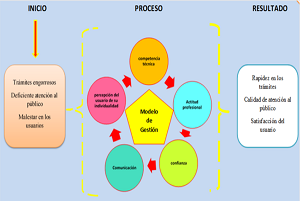Model of management for the satisfaction of external users in the courts
DOI:
https://doi.org/10.56926/unaaaciencia.v1i2.23Keywords:
attention quality, management model, satisfaction of the usersAbstract
The investigation began in the courts of the province of San Martín - Tarapoto, 2017, where a management model based on Shein's motivation theory was proposed, in order to increase user satisfaction. The study was of a descriptive-propositional type with a non-experimental design, with a sample of 175 individuals, including court users and collaborators, surveyed through a questionnaire created based on the dimensions of the variables. The results showed that 52% of them presented deficiencies in the characteristics of court management, and 7% efficiency; the level of satisfaction of court users was low with 47% and high with 9%. Concluding that the staff presented shortcomings in terms of the characteristics of the management of the courts such as the inappropriate use of their abilities, skills and knowledge, preventing them from reaching a high competitive level, it also states that there is a low level of satisfaction of users, the staff showed deficiencies in providing clear and precise information, lack of attention to user concerns, as well as an inability to discuss problems correctly.
Downloads
References
Aguerre, M. C. (2014). Satisfacción del cliente del Juzgado de Faltas de la Municipalidad de Ensenada [Universidad Nacional de la Plata]. https://doi.org/10.35537/10915/46849
Akram, T., Lei, S., Haider, M. J., & Hussain, S. T. (2020). The impact of organizational justice on employee innovative work behavior: Mediating role of knowledge sharing. Journal of Innovation & Knowledge, 5(2), 117–129. https://doi.org/10.1016/j.jik.2019.10.001
Arbulú Montoya, M. J. V. (2016). Gestión de recursos humanos y calidad de servicio, en el juzgado de paz letrado de La Banda de Shilcayo, San Martín – 2016 [Universidad César Valejo]. https://hdl.handle.net/20.500.12692/1567
Consejo Profesional de Ciencias Económicas de la Ciudad Autónoma de Buenos Aires. (2015). La gestión y las nuevas competencias en un mundo de cambios constantes. XII Congreso Internacional de Administración. https://archivo.consejo.org.ar/congresos/12congresoadmi.html
Delgado-Veliz, E. A. (2018). Gestión de calidad de servicio en instituciones del poder judicial ecuatoriano. Revista Científica FIPCAEC, 3(9), 53–69. https://doi.org/10.23857/fipcaec.v3i9.53
Heras, I. (2012). Nuevos modelos de gestión: apuntes complementarios. Universidad del país Vasco.
Hernández Salazar, P. (2011). La importancia de la satisfacción del usuario. Documentación de Las Ciencias de La Información, 34. https://doi.org/10.5209/rev_DCIN.2011.v34.36463
Hidalgo Ramírez, P. D. (2013). Modelo de gestión y administración de proyectos operacionales [Universidad de Chile]. https://repositorio.uchile.cl/handle/2250/114497
INFOTEP. (2012). Estudios de satisfaccion de clientes externos: empresas y participantes de los centros tecnologicos y centros operativos del sistema. Instituto Nacional de Formación Técnico Profesional.
Jiménez Torres, N. V., Borrás Almenar, C., Climente Martí, M., & Merino Sanjuán, M. (2006). Calidad farmacoterapéutica. Universitat de València. https://puv.uv.es/calidad-farmacoterapeutica.html
Kohama Aréstegui, C. H., & Palacios Trujillo, C. V. (2018). Calidad de servicio y satisfacción del usuario del área de infraestructura del Poder Judicial De Ambo, Huánuco, 2018 [Universidad César Vallejo]. https://hdl.handle.net/20.500.12692/32757
Magnier-Watanabe, R., Benton, C., & Senoo, D. (2015). A study of knowledge management enablers across countries. In The Essentials of Knowledge Management (pp. 175–195). Palgrave Macmillan UK. https://doi.org/10.1057/9781137552105_8
Maher, C. (2017). Understanding the impact of Organisational Culture on Managers’ Internal Career Needs. In Exploring the Influence of Personal Values and Cultures in the Workplace (pp. 265–285). https://doi.org/10.4018/978-1-5225-2480-9.ch014
Martínez-Tur, V., Peiró, J. M., & Ramos, J. (2001). Calidad de servicio y satisfacción del cliente. Sintesis.
Narvaez, C., Rivas, L. A., & Chavez, A. (2017). Modelos de gestión de la calidad en instituciones públicas de salud en México. Revista Innovaciones de Negocios, 12(24). https://doi.org/10.29105/rinn12.24-2
Navarro Arvizu, E. M. (2014). Modelo de gestión para mejorar el desempeño individual en una Organización de la Sociedad Civil de Ciudad Obregón, Sonora [Instituto Tecnológico de Sonora]. https://www.itson.mx/publicaciones/Documents/tesis-doct/tesiselbamyriam.pdf
Oh, S.-Y. (2019). Effects of organizational learning on performance: the moderating roles of trust in leaders and organizational justice. Journal of Knowledge Management, 23(2), 313–331. https://doi.org/10.1108/JKM-02-2018-0087
Parian Vivanco, D. I. (2017). Administración del cambio y el desempeño laboral de los trabajadores del módulo básico del poder judicial de San Juan de Lurigancho, 2016 [Universidad César Vallejo]. https://repositorio.ucv.edu.pe/handle/20.500.12692/6769
Rey Martín, C. (2000). La satisfacción del usuario: Un concepto en alza. Anales de Documentación, 3, 139–153. https://revistas.um.es/analesdoc/article/view/2451
Ricse, G. (2014). El grado de satisfacción de la calidad de servicio y el costooportunidad que genera incursionar en el sistema de justicia de Lima, de las mujeres asalariadas victimas del VCM en relaciones de pareja durante el año 2014. Universidad de San Martin de Porres.
Roblek, V., Meško, M., Pejić Bach, M., & Bertoncelj, A. (2014). Impact of knowledge management on sustainable development in the innovative economy. Advancements in Economic and Managerial Theory and Practice Universitas Mercatorum Via Appia Pignatelli, 62. https://doi.org/10.13140/2.1.1981.9522
Sáez Martin, J. E. (2014). Las claves de la gestión judicial en chile. Justicia, 19(25). https://doi.org/10.17081/just.19.25.657
Schein, E. H. (1993). Legitimating clinical research in the study of organizational culture. Journal of Counseling & Development, 71(6), 703–708. https://doi.org/10.1002/j.1556-6676.1993.tb02264.x
Schein, E. H. (2015). Organizational psychology then and now: some observations. Annual Review of Organizational Psychology and Organizational Behavior, 2(1), 1–19. https://doi.org/10.1146/annurev-orgpsych-032414-111449
Taylor, J. (2014). Organizational Culture and the Paradox of Performance Management. Public Performance & Management Review, 38(1), 7–22. https://doi.org/10.2753/PMR1530-9576380101
Torres, A. (2016). El cliente del Estado, por Alfredo Torres. El Comercio. https://elcomercio.pe/opinion/columnistas/cliente-alfredo-torres-265610-noticia/
Tsogtsuren, B., & Tugsuu, G. (2017). The impacts of organizational justice and culture, knowledge management and employee engagement on employee’s job SATISFACTION: THE CASE OF SUPPORTIVE SERVICE OFFICERS. Mongolian Journal of Agricultural Sciences, 19(3), 56–65. https://doi.org/10.5564/mjas.v19i3.736

Published
How to Cite
Issue
Section
License
Copyright (c) 2022 Teresa del Pilar López-Sánchez

This work is licensed under a Creative Commons Attribution 4.0 International License.
The authors retain their rights:
a. The authors retain their trademark and patent rights, as well as any process or procedure described in the article.
b. The authors retain the right to share, copy, distribute, execute and publicly communicate the article published in the scientific journal UNAAACIENCIA-PERÚ (for example, place it in an institutional repository or publish it in a book), with an acknowledgment of its initial publication in UNAAACIENCIA-PERU.
c. Authors retain the right to make a subsequent publication of their work, to use the article or any part of it (for example: a compilation of their works, notes for conferences, thesis, or for a book), provided that they indicate the source. of publication (authors of the work, magazine, volume, number and date).







